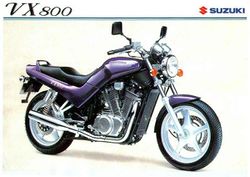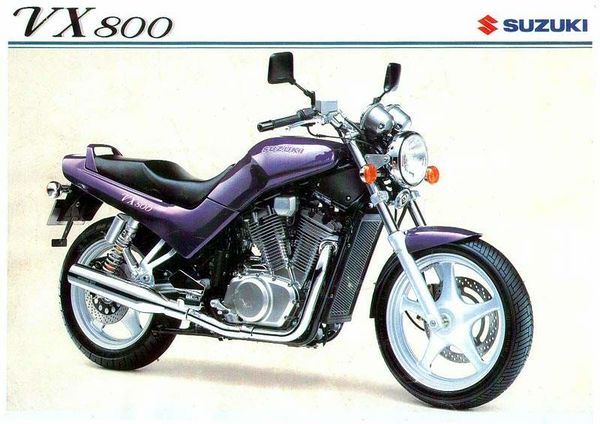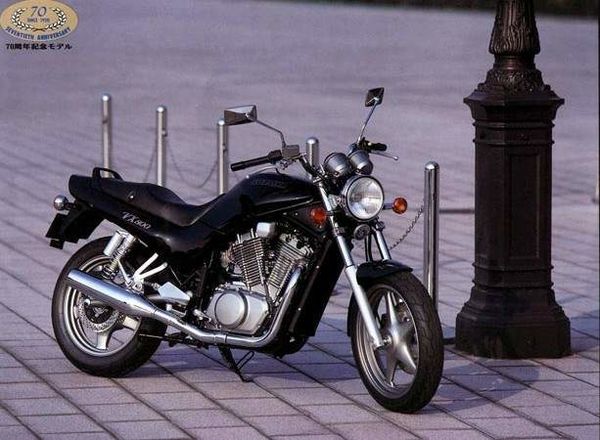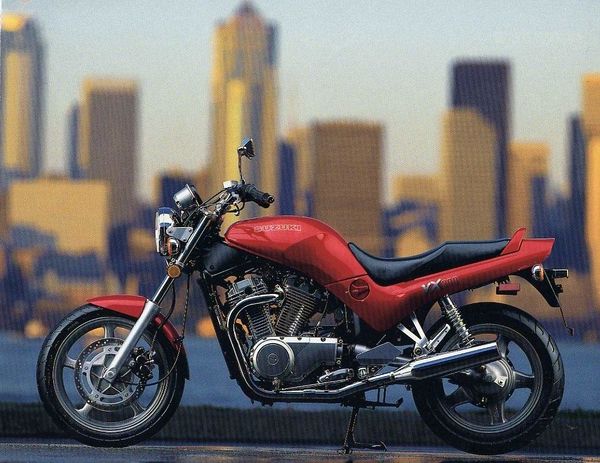Difference between revisions of "Suzuki VX800 Highlander"
(upgrading template) |
(adding recommended_oil) |
||
| Line 37: | Line 37: | ||
|fuel_capacity = 19 L / 5.0 US gal / 4.2 Imp gal | |fuel_capacity = 19 L / 5.0 US gal / 4.2 Imp gal | ||
|oil_capacity = | |oil_capacity = | ||
|recommended_oil=Suzuki ECSTAR 10w40 | |||
|fuel_consumption = | |fuel_consumption = | ||
|turning_radius = 3.0 m / 9.8 ft | |turning_radius = 3.0 m / 9.8 ft | ||
Revision as of 02:07, 10 November 2019
 |
|
| Suzuki VX800 Highlander | |
| Manufacturer | |
|---|---|
| Production | 1990 - 93 |
| Engine | Four stroke, 45°V-twin, SOHC, 4 valves per cylinder. |
| Compression ratio | 10.0:1 |
| Top Speed | 179.8 km/h / 111.7 mph |
| Ignition | CDI |
| Transmission | 5 Speed |
| Suspension | Front: Telescopic, coil spring, oil-damped Rear: Swingarm, coil spring, oil-damped |
| Brakes | Front: Single 310mm disc, 2 piston caliper Rear: Single 250mm disc, 2 piston caliper |
| Front Tire | 110/80-18 58H tubeless |
| Rear Tire | 150/70-17 69H tubeless |
| Wheelbase | 1550 mm / 61 in |
| Seat Height | 800 mm / 31.5 in |
| Weight | 213 kg / 470 lbs (dry), 228 kg / 503 lbs (wet) |
| Recommended Oil | Suzuki ECSTAR 10w40 |
| Fuel Capacity | 19 L / 5.0 US gal / 4.2 Imp gal |
| Manuals | Service Manual |
It could reach a top speed of 179.8 km/h / 111.7 mph.
Engine
The engine was a Liquid cooled cooled Four stroke, 45°V-twin, SOHC, 4 valves per cylinder.. The engine featured a 10.0:1 compression ratio.
Drive
Power was moderated via the Wet, multi-plate.
Chassis
It came with a 110/80-18 58H tubeless front tire and a 150/70-17 69H tubeless rear tire. Stopping was achieved via Single 310mm disc, 2 piston caliper in the front and a Single 250mm disc, 2 piston caliper in the rear. The front suspension was a Telescopic, coil spring, oil-damped while the rear was equipped with a Swingarm, coil spring, oil-damped. The VX800 Highlander was fitted with a 19 L / 5.0 US gal / 4.2 Imp gal fuel tank. The bike weighed just 213 kg / 470 lbs. The wheelbase was 1550 mm / 61 in long.
Photos
Overview
Suzuki VX 800
You may laugh, but one of my fave bikes last year was the Suzi GS500E. You don't remember it? Can't say I'm surprised. Well, it was an old aircooled 500 twin with a rorty zorst in a pretty, unfaired, simple but state of the art sports chassis. For me it was what pure, unadulterated, road bike fun was all about. It struggled to do more than 110 flat out, the windblast tried to pull my head off at anything over 90, yet it steered and braked wonderfully, was plain gorgeous to look at and it was cheap. And hardly anyone bought one. Now then, I hate to sound like the prophet of doom an' all, but guess what, the VX800 is like that. A longer-legged, big US cousin to the GS - only more relaxed, more lumbering and more big, bad mutha-ish. It's big but light; simple but refined and yet every grommett and circlip oozes the joy and honest pleasure of biking at it's most natural and rose-tinted. And it's every inch as nice as the GS500. The immediate handicap for the V-twin VX800 is that it's based on the VS750 Intruder factory custom and seeing as that was as boring as death we'll get through this technical malarky as quickly as poss to prevent y'all falling asleep. In simple speak, a 3mm overbore takes the VX up to 805cc with carb sizes up from 34 to 36mm to match. The front downdraft Mikuni uses a fuel pump to draw juice from the low slung tank while at the butt-end the two-into-two zorsts are linked by a balance pipe just forward of the twin concave cone-type silencers. Vibration has been tackled on two fronts; the pistons, tho' bigger, are slightly dished and actually lighter than those on the Intruder, while the crank pins are now set 75 degrees apart (compared to 45 degrees on the Intruder) to counter crank vibes. In all, it's enough to convince Suzuki's engineers to dispense with rubber engine mounts entirely and concentrate instead on siting the twin lump further forward in the frame to throw more weight over the front and improve steering response. This, really, begins to hint at what the VX really is. At first glance it's a chopped chop; a low-rider V-twin shaft; just another factory custom; all show and no go. But don't believe it for a second. Apart from shifting the weight bias forward, the steering has itself been sharpened by knocking rake back to a still lazy 31 degrees (from the Intruder's 36) with trail shortened in equal measure. Despite this, wheelbase is unchanged at a long-ish 1,550mm (61 ins). "Begad, how've they managed that?" I hear you ask. Well effectively what they've done is to squash-in the front but extend the swingarm and drive shaft to compensate. This has a couple of knock-on effects; the reduced area between the front frame tubes and the 18-inch ally wheel required a new slimline rad which feeds through hoses hidden away in the frame tubes as before. While at the rear the longer shaft effectively wipes out any of that pogoing characteristic of most shafts on the gas. This lean cuisine ethic has also meant the retention of a twin shock back end each with five preload settings and a four-position dial for rebound. The front 41 mm teles, by the way, ain't adjustable. Braking's taken care of by a single 310mm disc/tandem big-and-little two-pot caliper at the front with a dual opposed caliper and disc at the rear. Top side, however, the VX is pure mouth-wateringly simple: no fairings, no paraphernalia, no complications. Exit common or garden black plastic consoles, enter just two neat white-faced clocks mounted on a tasty alloy plate with a row of round dot idiot lights underneath. Again, it's just like the GS500 (altho' it's clocks were conventional, black-faced items) and it's just as gorgeous. Temperature checks are taken care of by a small warning light in the tacho, switchgear is the usual Suzuki fare and handy with it and the brake lever is four-way span adjustable. More refreshing still are the bars: yup, wait for it, they're one-piece chrome tube with two clamps on the top yoke. Just like they used to be. And if you don't like 'em a variety of different height options are available. The seat is narrow-ish but thickly padded with space enough for two and the mirrors are widely-spaced and useful but blow backWards at around ton twenty.
THE MEANING
Suzuki would have us believe that all this adds up to, and I quote "a Modern Classic ... with all the character and excitement and charm of a traditional, twin-cylinder sportbike but without the hassles." Personally, I love the sentiment but barf at the corporate-speak, simply because this is a bike which deserves not to be pidgeon-holed. Riding the VX for the first time after months of super-doop sports missies interspersed with my KR-I felt like I'd walked out of a high tech kitchen and into a sunny, fragrant back yard full of fresh unkempt grass and the flavours of the country. Suddenly I wasn't a pilot, a scratcher or a touring Johnny; biking wasn't about being the fastest, having the best range or reeling off the most impressive facts and figures, it was just me, 100 per cent pure bike and miles and miles of the open road to discover and enjoy. The riding'position is pretty well upright and I'd have preferred the bars slightly narrower - but it's more Guzzi than BMW. The motor rumbled it's intoxicating brumm (it's the only engine I've ever come across which actually went brumm) first prod every time, and it was a sweet snick into first before she and I went to open up our eyes and lungs and breath biking as it could only be on a fairing-less twin. The power and torque delivery combine so smoothly they conspire to make the throttle a tool purely of pace rather than a device for hunting out the best the engine can give. It's flexible enough to pull first from idle on the flat and then rev unfalteringly up to just before the redline in all five gears. The lack of flywheel means it's smooth with purring, predictable throttle-response rather than out and out stonk. And the lack of significant peaks or troughs in the delivery makes the excellent gearbox and clear tacho almost redundant. It's also quicker than I'd expected. Top (fifth) is geared for about 80 at 5,500rpm with 105 at seven thou and 110 250 revs further still (which is when my neck almost snapped, the mirrors folded backWards and my magnetic tankbag blew off). That predicts 125 at the redline', tho' the best I saw was 120. You'd have to be seriously desparate to go for it all. But I didn't want it all. The VX isn't a bike on which you want to explore the outer limits of every corner. It's a cliche I know, but it's not the getting there but the journey that counts. I stayed off motorways whenever and wherever I could. The VX would cruise happily enough at 85/90, but doing that for more than 45 minutes slowly tensed up every nerve and sinew in my arms and neck. Off the motorway, however, whether in town or out, the VX was a fresh, bubbly evocation of almost everything biking. If I'd been on a cruiser the straights would have been a pose and the twisties a pain. If I'd been on a true sportster the corners would have been a joy and the straights a tedium I could only break by being a hooligan. But with the VX I was enjoying both. If I came across a tight 60mph bend I'd just cautiously snick down to fourth, dab the superb front brake, throw the VX in and rumble round and out on the throttle. Changing line, braking or getting back on the power early is easy. The single disc is strong enough to lock the front wheel (tho' it won't pull stoppies - it's too long for that) and each time it had the fzzzz of pad on drilled disc so characteristic of, yes, the GS500. On the VX I was far enough below FZR standards to forget them, to throw away my competitive insticts and simply enjoy the VX and the road for what they were - not what I thought they could or should be. The steering is light and occasionally twitchy, but the long wheelbase means it's acceptably stable and unflustered. The soft fork wallows and wanders slightly, but the lack of weight meant it wasn't worried or worrying. And if the rear shocks too were oversoft and finickety, winding preload up a step and dialing rebound up to three transformed it into a calm compliant adjunt to the fulsome biking experience the VX had become. Ok, so ground clearance was marginal (especially on its Metzeler rubber -1 wore out most of the mainstand, right peg and silencer for the sake of the pics), but it'd usually take three laps of a favourite roundabout to get that far - otherwise it was no prob. Ok, so the slightly restrictive lock knocked the VX from being the superlative town bike it'd otherwise have been (low, light-ish, narrow, easily manouvereable, comfy, plonky motor, ace brakes, great pose etc) - but it was still about the best thing imaginable for blatting round Paris. And no, it isn't a motorway eater either. It never looked like it was going to be. But then again, a handlebar fairing is an extra (along with Krauser saddle bags), the seat is comfortable, range is reasonable at around 150 miles, and the shaft, without noticeable reaction of any sort, was a positive boon so maybe it would be enough. But the great thing about the VX was that I rode it and, almost inexplicably, it was enough. I didn't find myself niggling about what bits I'd change or making comparisons with other bikes -simply because there's nothing to compare it with. The best I could come up with was that it was like a bigger, slightly Americanised GS500E but with a sorted Africa Twin engine inside. I like you probably - might have looked at it first time round, seen the chrome, the pose, the con of exhausts designed just to make it sound right, etc. But the fact is it all works, it's all enough, so versatile and so enjoyable. At £4,249 it's not quite 'cheap' (£ 100 more than a GSX750F, for example) but it is 1500 quid less bike that defies our modern fetish for labels, monikers and groupings - it's just a bike in it's plainest, most approachable form. My only real misgiving is that it's a V-twin - a Jap V-twin. If it'd been powered by a Super Tenere engine with a monoshock rear the VX would have been simply stunning. As it is, because it's a shiny V-twin and being marketed as a 'classic' I reckon it'll be looked upon as a poseur's summer toy. But I hope I'm wrong.
Source Bike 1990
| Make Model | Suzuki VX 800 Highlander |
|---|---|
| Year | 1990 - 93 |
| Engine Type | Four stroke, 45°V-twin, SOHC, 4 valves per cylinder. |
| Displacement | 805 cc / 49.1 cu in |
| Bore X Stroke | 83 x 74.4 mm |
| Compression | 10.0:1 |
| Cooling System | Liquid cooled |
| Lubrication System | Wet sump |
| Induction | 2 x 36mm Mikuni BDS36 / BS36 carburetors |
| Ignition | CDI |
| Starting | Electric |
| Max Power | 44.6 kW / 61.2 hp @ 6800rpm |
| Max Power (at Rear Tire) | 41.9 kW / 56.2 hp @ 7500 rpm |
| Max Torque | 72 Nm 7.3 kgf-m / 53.1 lb-ft @ 5400 rpm |
| Clutch | Wet, multi-plate |
| Transmission | 5 Speed |
| Final Drive | Shaft |
| Gear Ratios | 1st 2.285 / 2nd 1.631 / 3rd 1.227 / 4th 1.000 / 5th 0.851:1 |
| Final Reduction | 3.390:1 |
| Front Suspension | Telescopic, coil spring, oil-damped |
| Rear Suspension | Swingarm, coil spring, oil-damped |
| Front Brakes | Single 310mm disc, 2 piston caliper |
| Rear Brakes | Single 250mm disc, 2 piston caliper |
| Front Tire | 110/80-18 58H tubeless |
| Rear Tire | 150/70-17 69H tubeless |
| Rake | 31o |
| Trail | 128 mm / 5.04 in |
| Dimensions | Length: 2281 mm / 89.8 in Width: 805 mm / 31.7 in Height: 1115 mm / 43.9 in |
| Wheelbase | 1550 mm / 61 in |
| Ground Clearance | 145 mm / 5.7 in |
| Seat Height | 800 mm / 31.5 in |
| Steering Angle | 35o (left to right) |
| Turning Radius | 3.0 m / 9.8 ft |
| Braking: 50 Km/h - 0 | 14 m / 46 ft |
| Dry Weight | 213 kg / 470 lbs |
| Wet Weight | 228 kg / 503 lbs |
| Fuel Capacity | 19 L / 5.0 US gal / 4.2 Imp gal |
| Fuel Reserve | 3.3 L / 0.9 US gal / 0.7 Imp gal |
| Consumption Average | 6.2 L/100 km / 16.2 km/l / 38.1 US mpg / 45.8 Imp mpg |
| Standing ¼ Mile | 13.1 sec / 158.7 km/h / 98.6 mph |
| Top Speed | 179.8 km/h / 111.7 mph |


